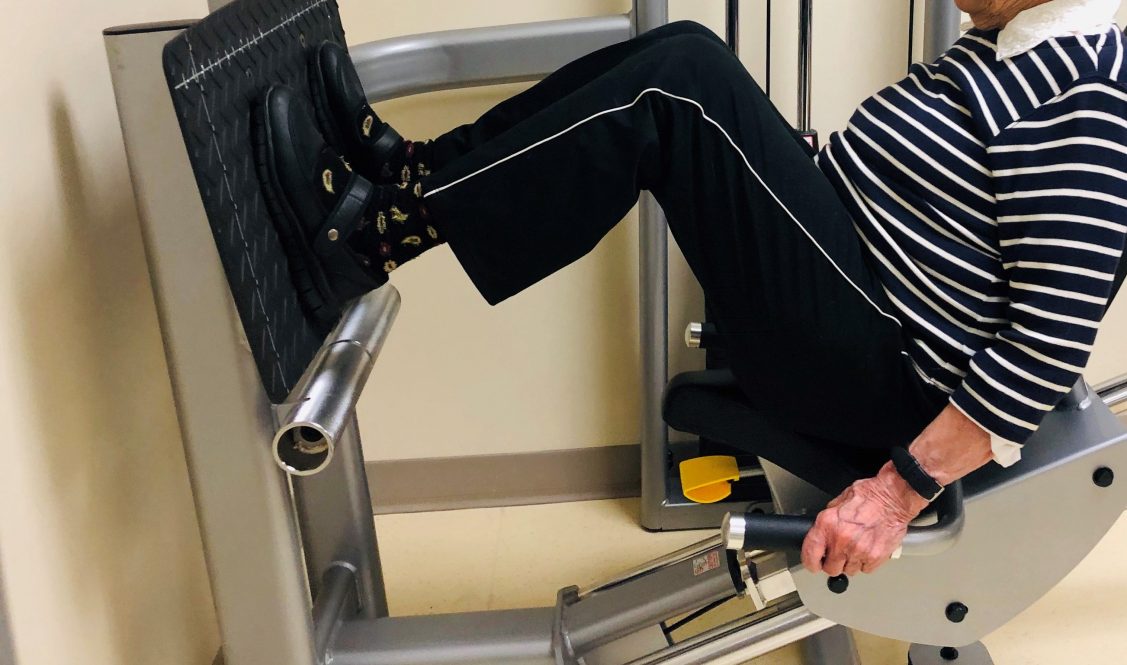After a hip fracture, sadly, statistics show that over 75% of older adults never return to their pre-fracture level of daily function and mobility.
But, 94-year-old Ruth Vaccaro of South Glastonbury is beating the odds thanks to an innovative clinical trial underway at the UConn Center on Aging at UConn Health.
“I’m walking better than I did before my hip fracture!” exclaims Vaccaro.
That’s thanks to the STEP-HI study (Starting a Testosterone and Exercise Program after Hip Injury) working to improve function in women who’ve broken a hip, she participated in at UConn Center on Aging.
Vaccaro, who lives independently with her two golden retrievers, Abby and Becky, fell and broke her hip on Jan. 29. She was rushed by ambulance to the hospital, where she underwent surgery the next morning. Following surgery, she went through the standard protocol that included three weeks of physical therapy at a rehabilitation center, and a few follow-up home visits from physical therapy.
According to Dr. George Kuchel director of the UConn Center on Aging, falls can be a catastrophic event for older adults.
“One in three older adults will die within a year of the event while only one in four can regain their previous level of function post-hip fracture,” says Kuchel.
When an older woman sustains a hip fracture, standard physical therapy sometimes is not enough. The STEP-HI study is a multi-site clinical trial, researching the benefits of exercise training and hormone replacement on hip fracture recovery in older women.
As the clinical trial’s lead investigator at UConn Center on Aging, Dr. Jenna Bartley explains, “As we age, we lose muscle mass and strength, and especially after an injury, it’s hard to regain these losses. Older women after hip fracture may just need an extra boost to get them back in their pre-fracture ability level.”
When Vaccaro received the call to participate in the study at UConn Health, she accepted right away. Despite completing traditional physical therapy, she still couldn’t move around like she did before her fall. As part of the trial, she attended exercise training sessions two times a week for six months and applied a gel daily. As part of the blinded clinical trial, some patients will receive a placebo gel and others a gel with testosterone.
In addition to walking better than she did before her hip fracture, Vaccaro has even more than doubled the amount of weight she can leg press since she started the exercise program. She is now leg pressing more than 70 lbs.
“I’m so much stronger,” says Vaccaro. “It’s great!”
Now that her time in the study has concluded, she continues to do her exercises at home and keeps walking every day and spending more time with her dogs and crocheting.
The STEP-HI clinical trial is currently enrolling women over the age of 65 who have fractured a hip within six to twenty weeks. Study participants are randomly assigned to one of three groups. Two groups participate in supervised exercise training and are asked to apply a gel, daily while a third group is given exercises to do at home.
In addition to the exercise training, all participants receive free vitamin D and calcium supplements, a mammogram, bone density tests and transportation to and from UConn Health.
On top of all these benefits, participants love the added value of being watched closely by a team of healthcare professionals throughout the study,” says Heather McAbee-Sevick, the study coordinator at UConn Center on Aging.
The multisite STEP-HI trial located at UConn Health is co-led by Kuchel, Bartley, and Richard Fortinsky, Ph.D. Interested individuals and healthcare providers can contact site study coordinator Heather McAbee-Sevick at 860-679-6115 or mcabeesevick@uchc.edu for more information.



